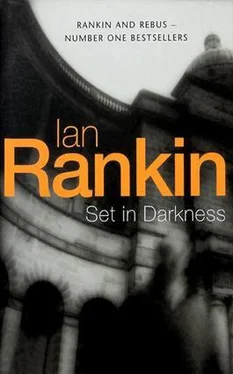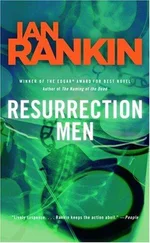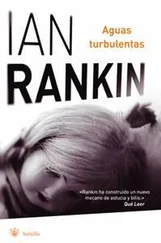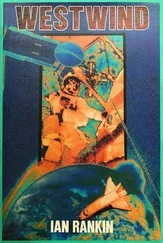‘So what can I do for you?’ The commerce of the everyday: people wanting things from people. Sometimes it was an exchange, sometimes not.
‘I want to know what’s happening.’
‘Happening?’
‘The murder inquiry: we’re being kept in the dark.’
‘I don’t think that’s true.’
She lit a cigarette; didn’t offer him one. ‘Well, is anything happening?’
‘We’ll let you know as soon as we can.’
She straightened her back. ‘That’s not good enough.’
‘I’m sorry.’
She narrowed her eyes. ‘No, you’re not. The family should be told—’
‘In point of fact, it’s the widow we’d talk to first.’
‘Seona? You’ll have to get in the queue. She’s a media darling now, you know. Papers, TV... falling over themselves for a photo of the “brave widow”, carrying on where her husband left off.’ She modulated her voice, imitating Seona Grieve: ‘“It’s what Roddy would have wanted.” Like hell it is.’
‘How do you mean?’
‘Roddy may have seemed the quiet type, but there was steel in him, too. His wife running for MSP? He wouldn’t have wanted that. It turns her into the martyr rather than him. He’s already being forgotten about, except when she dusts off the corpse in the great cause of publicity!’
There were only the two of them in the bar; all the same, the barmaid gave a warning look.
‘Easy,’ Rebus said.
Her eyes were liquid with tears. Rebus got the feeling they weren’t for anyone but Lorna herself: the lost one, the forgotten one. ‘I’ve got the right to know what’s going on.’ Her eyes were clearing as she looked at him. ‘Special rights,’ she said in a low voice.
‘Look,’ he said, ‘what happened that night—’
‘I don’t want to hear it.’ She shook her head, steadied herself with another gulp of Bloody Mary, reducing it to ice.
‘Whatever you’re going through, if I can help I will, but don’t resort to blackm—’
She was on her feet. ‘I don’t know why I came.’
He stood up, grabbed her hands. ‘What have you taken, Lorna?’
‘Just some... My doctor prescribed them. Not supposed to mix with alcohol.’ Her eyes were everywhere but on him. ‘That’s all it is.’
‘I’ll get a patrol car to run you—’
‘No, no, I’ll find a cab. Don’t worry.’ She modelled a smile for him. ‘Don’t worry,’ she repeated.
He picked her bags up for her; she seemed to have forgotten they were there. ‘Lorna,’ he said, ‘have you ever met a man called Gerald Sithing?’
‘I don’t know. Who is he?’
‘I think Hugh knows him. He runs a group called the Knights of Rosslyn.’
‘Hugh keeps that side of his life separate. He knows I’d laugh at him.’ She was on the verge of laughing now; she was on the verge of more than laughter. Rebus led her from the bar.
‘Why do you ask?’ she said.
‘Doesn’t matter.’ He saw Grant Hood waving from across the road. In the distance, Siobhan Clarke and Ellen Wylie were unloading their cars. Hood dodged the traffic.
‘What’s up?’ Rebus asked.
‘The reconstruction,’ Hood told him breathlessly. ‘We’ve got a printout.’
Rebus nodded thoughtfully, then looked towards Lorna Grieve. ‘Maybe you should see this,’ he said.
So they went into St Leonard’s and took her to an empty office. Hood fetched the computer graphic while Rebus provided tea. She wanted two sugars; he added a third, watched her drink.
‘What’s the mystery?’ she asked.
‘It’s a face,’ he explained slowly, studying her. ‘The university in Glasgow put it together for us from a skull.’
‘Queensberry House?’ she guessed, amused by his look of surprise. ‘Not all the brain cells have emigrated to a better place. Why do you want me to see it?’ Then that, too, came to her. ‘You think it might be Alasdair?’ She started shaking; Rebus realised his mistake.
‘Maybe it’d be better if—’
Rising to her feet, she knocked the tea on to the floor, but seemed not to notice. ‘Why? What would Alasdair be doing...? He sends postcards.’
Rebus was cursing himself for being an insensitive bastard, short-sighted, unsubtle, twisted.
And then Grant Hood was in the doorway, brandishing the picture. She snatched it from him, stared at it intently, then burst out laughing.
‘It’s nothing like him,’ she said. ‘You bloody imbecile.’
Imbecile: he hadn’t got to that one yet. He took the sheet from her. It was a good likeness of someone, but he had to agree: judging by the paintings in Alicia Grieve’s studio, this was not her son. The face was a completely different shape, hair a different colour... cheekbones, chin, forehead... No, whoever it was in the fireplace, it wasn’t Alasdair Grieve.
That would have been too simple. Rebus’s life had never been simple; no reason to suppose it would start now.
Wylie was in the doorway, too, alerted by the laughter: not a regular sound in a police station.
‘He thought it was Alasdair,’ Lorna Grieve was saying, pointing at Rebus. ‘He told me my brother was dead! As if one wasn’t enough.’ There was poison in her eyes. ‘Well, you’ve had your little laugh, and I hope you’re happy.’ She stormed out of the office and down the corridor.
‘Go after her,’ Rebus told Wylie. ‘Make sure she finds the way out. And here...’ He stooped down, retrieved the shopping bags. ‘Give her these.’
She stared at him for a moment.
‘Go!’ he yelled.
‘I hear and obey,’ Ellen Wylie muttered. After she’d gone, Rebus slumped back down on his chair, rubbed both hands through his hair. Grant Hood was watching him.
‘Not looking for tips, I hope,’ Rebus told him.
‘No, sir.’
‘Because if you are, here’s the best I can offer: study what I do, and then strive to do the exact fucking opposite. That way, you might make something of yourself.’ He dragged his hands down his face, stared at the picture.
‘Who the hell are you?’ he asked. For some reason, he knew Skelly was the key, not just to Hastings’ suicide and the four hundred grand, but to Roddy Grieve’s murder, too... and maybe a lot more besides.
They sat in the cramped interview room, door closed to passers-by. People in the station were beginning to talk about them, calling them ‘the Manson family’, ‘the Lodge’, ‘the swingers’ club’. Hood was seated in the corner. He had the computer set up. Its screen was weird: black background, orange writing. He’d warned that the disks might be corrupted. Rebus, Wylie and Clarke sat round the centre table, box-files at their feet, the computer-generated image of the Queensberry House victim in front of them.
‘You know what we have to do?’ Rebus told them. Wylie and Clarke shared a look, sceptical of that ‘we’.
‘MisPers,’ Wylie guessed. ‘Back into the files and try to match this with one of the photos.’
Rebus nodded; Wylie shook her head. He turned to Hood: ‘Any problems?’
‘Seems to be running fine,’ Hood said, hammering keys two-fingered. ‘Printer connection’s a problem. None of the ones we’ve got will fit. Might have to scour the second-hand shops.’
‘So what’s on the disks?’ Siobhan Clarke asked.
He looked at her. ‘Give me a chance.’ And got back to work. Ellen Wylie lifted the first box-file on to the table and opened it. Rebus hoisted up three more, patted them.
‘I’ve already done these,’ he said. The others looked at him. ‘Late night,’ he said, winking.
Just so they knew he wasn’t slacking.
Lunch consisted of sandwiches. By the time they broke at three for coffee, Hood was beginning to get somewhere with the disks.
Читать дальше












